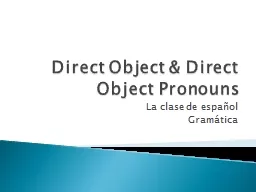PPT-Pronouns Pronouns & Antecedents
Author : sherrill-nordquist | Published Date : 2018-12-06
Subject amp Object Possessive Reflexive Interrogative Pronouns A pronoun is a word that takes the place of one or more nouns pro means for standing FOR a noun Personal
Presentation Embed Code
Download Presentation
Download Presentation The PPT/PDF document "Pronouns Pronouns & Antecedents" is the property of its rightful owner. Permission is granted to download and print the materials on this website for personal, non-commercial use only, and to display it on your personal computer provided you do not modify the materials and that you retain all copyright notices contained in the materials. By downloading content from our website, you accept the terms of this agreement.
Pronouns Pronouns & Antecedents: Transcript
Download Rules Of Document
"Pronouns Pronouns & Antecedents"The content belongs to its owner. You may download and print it for personal use, without modification, and keep all copyright notices. By downloading, you agree to these terms.
Related Documents














